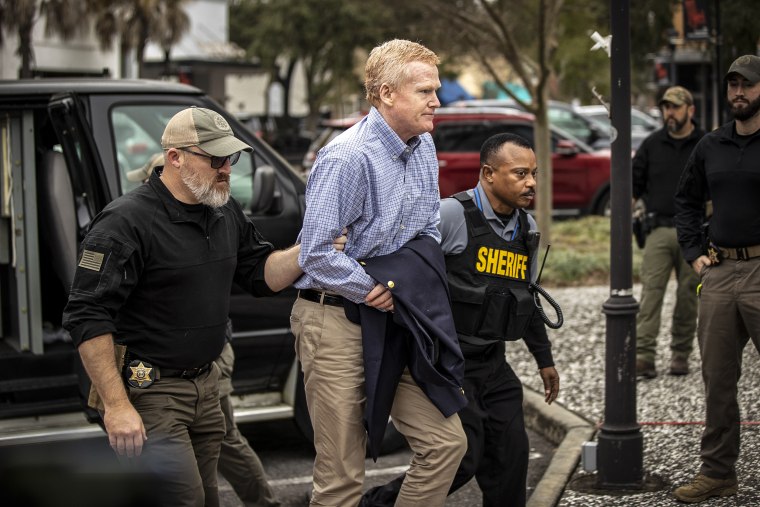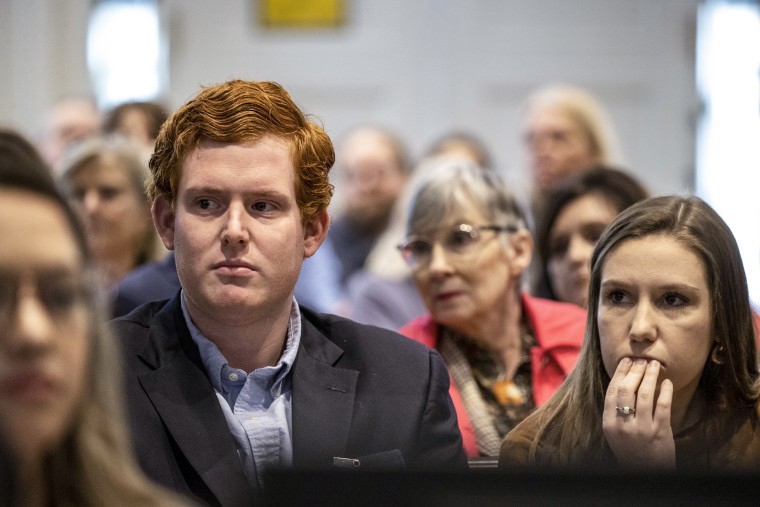[ad_1]
It was a video meant to evoke to jurors a loving moment in the Murdaugh family: During Memorial Day weekend in 2021, youngest son Paul presenting a white sheet cake to his father, Alex, while his mother, Margaret, looks on and party guests serenade him with “Happy Birthday.”
“Thank y’all so much,” Alex Murdaugh said in the short clip, shown by his defense team Wednesday during his double murder trial in Colleton County, South Carolina.
Murdaugh, 54, is accused of fatally shooting wife Margaret, 52, and Paul, 22, just days after that celebration, in an act that state prosecutors contend was done to cover up his slew of alleged financial misdeeds and garner sympathy ahead of being publicly exposed.
“When the hounds are at the door, when Hannibal’s at the gates for Alex Murdaugh, violence happens,” chief prosecutor Creighton Waters said in court.
But the defense’s effort to cast Murdaugh, a once-powerful lawyer and part-time prosecutor in South Carolina’s Lowcountry, as a beloved patriarch incapable of slaying his wife and son also allowed for his character to be called into question. During the defense’s cross-examination of a friend of Paul’s, named Will Loving, he was shown the birthday video and asked if there was any reason he could think of that Murdaugh would kill his wife and son.

“That, in effect, turned the cross-examination of that witness from dealing with the specific issues in the case to having that witness testify as a character witness for Mr. Murdaugh,” Circuit Court Judge Clifton Newman later told the prosecution and defense, adding that it “opened the door” for the state to bring up Murdaugh’s financial troubles because “evidence of other crimes or bad acts is necessary if it is an essential part of the crimes on trial.”
Murdaugh’s defense team has tried to argue that his finances are only being used to vilify him and aren’t definitive proof he committed the murders.
“They’ve got a whole lot more evidence about financial misconduct than they do about evidence of guilt in a murder case. And that’s what this is all about,” defense lawyer Jim Griffin said in court.
While Newman said he’s inclined to have Murdaugh’s alleged financial crimes submitted into evidence, an outstanding question remains: Will the jury hear any of it?
Trial within a trial
A half-dozen witnesses have testified so far concerning Murdaugh’s finances — but without the jury present.
Newman has been listening to the testimony, including from Murdaugh’s former colleagues and banking associates, to ultimately decide the extent to which the jury should be allowed to hear that same evidence. A decision could come as soon as Monday, at the start of the trial’s third week.
Prosecutors have said that Murdaugh himself allowed his alleged financial impropriety to be a focus of the trial when he suggested to authorities, just after his wife and son were killed, that the slayings may have been related to a boating accident involving Paul.
“My son was in a boat wreck months back; he’s been getting threats,” Murdaugh told a sheriff’s deputy in a video shown in court during the first week of the trial.
In 2019, Paul was in a boat crash that resulted in injuries and claimed the life of a 19-year-old passenger, Mallory Beach. Her family filed a wrongful death lawsuit against the Murdaughs, who owned the boat, and the convenience store chain that was alleged to have sold alcohol to the underage occupants.
State grand jury subpoenas had been issued in the boat crash case in 2021, and at the time of the killings of Margaret and Paul on June 7, Paul was facing trial on a charge of boating under the influence.
Prosecutors say Murdaugh was under immense pressure as the lawsuit and various other financial woes were unraveling. Earlier on the day of the slayings, Murdaugh was confronted by his law firm about $792,000 in missing legal fee funds.
Jeanne Seckinger, the chief financial officer of Murdaugh’s former law firm, testified Thursday — and without the jury present — that the money was from a case that he had worked on with another lawyer, Chris Wilson.
Seckinger said Murdaugh gave her a “dirty look, not one I’d ever received from Alex,” when she began pressing him to turn over financial records. She said he then shifted the conversation after getting a phone call about his gravely ill father, Randolph Murdaugh III, who would end up dying three days after the murders.
With the killings of Margaret and Paul, Seckinger’s investigation into the missing funds was put on hold.
Wilson also testified Thursday in the absence of the jury, saying he trusted Murdaugh as his longtime friend and helped him financially by lending him $192,000 meant to go toward paying back the missing $792,000. But Wilson said Murdaugh never reimbursed him, and that on the morning of Sept. 4, 2021, when he went to confront him, Murdaugh instead confessed he was an opioid addict and “he had s— a lot of people up.”
Later that day, Murdaugh would be involved in an apparent roadside shooting in which authorities alleged he arranged for a man to kill him so that Murdaugh’s older son, Buster, could collect on a $10 million life insurance policy.
“I was so mad. I had loved the guy for so long, and I probably still loved him a little bit,” Wilson said, choking back tears, “but I was so mad.”

Alibi in question
Prosecutors this week sought to chip away at Murdaugh’s claim that he wasn’t at the location where his wife and son were killed and that he had an alibi.
He had told investigators that the last time he saw his family was earlier in the evening at dinner, then took a short nap before leaving to visit his ailing mother.
But in video presented this week taken from Paul’s cellphone, three voices could be heard talking in the background. Prosecutors said Paul was trying to capture video of a dog’s tail as the voices spoke about whether a dog had a chicken or guinea in its mouth.
The owner of the dog in the video, a close family friend named Rogan Gibson, testified Wednesday that Paul had been watching the animal for him at the family’s Colleton County estate and he spoke with Paul at about 8:40 p.m. on the night of the murders.
In the background, Gibson said, he heard Margaret and a male voice whom he told investigators he was “99%” sure belonged to Murdaugh. (He reiterated in court that he was “positive” it was Murdaugh.)
After they hung up, Paul took the cellphone video, which was timestamped at 8:44 p.m. At 8:49 p.m., Gibson texted Paul to “see if you can get a good picture of” the tail, according to the evidence presented at trial. However, Gibson never got a response; he texted Paul again about an hour later but didn’t hear back.
Prosecutors say Margaret and Paul were killed at about 8:50 p.m. Their bodies were found near the dog kennels and both were shot multiple times with different firearms, according to the evidence presented at trial.
During cross-examination, defense lawyer Jim Griffin spoke with Gibson about how guns may have been left unprotected around the family’s sprawling estate for presumably anyone to use, and that there was no noticeable strife among Murdaugh and his family.
“Can you think of any circumstance that you can envision, knowing them as you do, where Alex would brutally murder Paul and Maggie?” Griffin asked.
Gibson replied: “Not that I can think of.”
What’s next?
Prosecutors have called close to two dozen witnesses before the jury, although the list of potential witnesses is at more than 250.
Cellphone and ballistic forensic experts, along with state law enforcement agents who responded to the scene, have made up the bulk of those called so far. Other possible witnesses of note in the coming days include Curtis Edward Smith, the man who authorities allege Murdaugh hired to kill him, and Murdaugh’s oldest son, Buster.
Still unclear is how any of the alleged financial malfeasance will be introduced to jurors.
The defense should be worried, Laura Jarrett, an NBC News senior legal correspondent, said on the “TODAY” show.
“The risk is that it’s so prejudicial, that the jury will be so bothered by all these alleged financial misdeeds that it will be so distracted that they’ll say, ‘Let’s just throw the book at him. He must be guilty of something,'” Jarrett said.
But whether or not the prosecution’s argument that Murdaugh’s spiraling financial situation caused him to take the life of his wife and son will sway the jury “remains to be seen,” Jarrett added.
If convicted, Murdaugh could receive 30 years to life in prison.
[ad_2]
Source link

